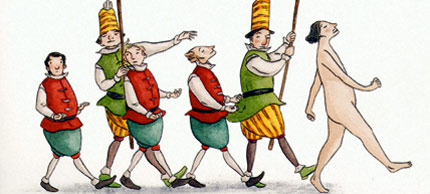
You would think that by now,
SCOTUS would have become
so embarrassed in how
it blunders its way through patent related matters that it would cease and desist from shaming itself more(e.g.:
... KSR,
... Bilski,
...Prometheus,
...Myriad,
... and now, Alice.
But not so.
In connecting the recent historical dots, we see a SCOTUS (Supreme Court of the US) of ever increasing incompetence in things scientific and patent related. The Court has no clue how incompetent it is. (See Dunning–Kruger effect.) Egged on by equally incompetent journalists (those who don't know a trademark from a trade secret or a patent), it parades naked and unafraid into a perilous blight of intellectual bankruptcy.

Instead of honestly admitting they know not of what they speak (exception being Scalia J. in Myriad), the Justices have become down right proud in their growing ability to fling with golden tongues, totally and patently nonsensical jargon about claims being "drawn to" some self-conjured up "abstraction" or about there being a penultimate "generic" computer that the "coders" out there can over weekend's twilight, re-code to "make it so" with respect to any "simple-is-as-simple-does" idea imparted to their keyboard-shackled hands on a Friday night from a hindsight ignobled Court.

Indeed, in SCOTUS mind, all computer-implemented inventions are mere child's play; starting with a hindsight enunciated "idea" and then adding to it the SCOTUS recipe ingredient of doing "not enough" aside from making such so upon thine generic computer (a.k.a. general-purpose computer); whereby one's hindsight genius mirror inevitably shows a not-quite-inventive invention that is rendered patent "ineligible" and obvious to boot by a know-it-when-I-see-it intellectual process. Potter Stewart is proud of you oh brethren of the corn ... (Click on 'Read More' below)

The know-it/see-it SCOTUS educates on what claims are and do ...
- "claims are designed [for example in this case,] to facilitate exchange of financial obligations"
- "claims are implemented"
- "claims are patent ineligible because they are directed"
- claims have "elements" that are considered individually and “as an ordered combination”
- one or combination of such elements defines the "inventive concept” of the claim
- claims can be "drawn to" other stuff, like to abstract ideas
- claims have a face (On their face,")
- claims can require "generic computer implementation"
- all patents have a "representative" claim with which all other claims swim or drown
 Gee whiz, yea know-it [all]/see-it [all] SCOTUS, thank you for educating us patent practitioners on the fundamentals of what patent claims "are" and "do".
Gee whiz, yea know-it [all]/see-it [all] SCOTUS, thank you for educating us patent practitioners on the fundamentals of what patent claims "are" and "do".

May be in the next pedantic installment
the know-it [all]/see-it [all] SCOTUS can educate life science practitioners on what a "gene" is?
Oh wait. They already have in the Myriad case.
May be in the next teaching moment,
the know-it [all]/see-it [all] SCOTUS can educate "generic" science practitioners on what a "law of nature" is?
Oh wait. They already have in the Prometheus case.
May be in the next college level lecture,
the know-it [all]/see-it [all] SCOTUS can educate information science practitioners on what a "computer" is and what makes one computer "generic" and another not so "generic"?
Oh wait. When the Emperor parades naked and unafraid, only the little boy is entitled to point out that truth.
How did we get to this point?
Where the clueless SCOTUS is babbling total babble in areas of science and law practice where clearly they now not of what they froth from the mouth?
Where the clueless SCOTUS is obviously parroting mindlessly from crib sheets passed to them from the Latin-speaking "frenemies" of the court?
"Generic" computer indeed!


No comments:
Post a Comment